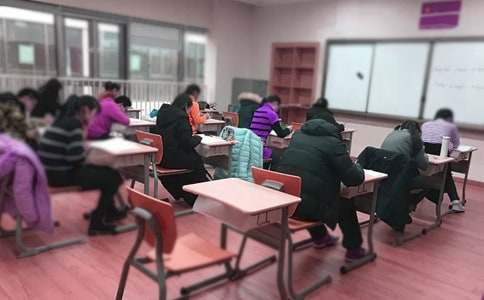2016公共英语五级考试完型填空模拟题
2016年下半年全国外语水平考试pets5级(简称WSK)考试将于11月19日、20日举行,大家备考得如何了?以下是yjbys网小编整理的关于公共英语五级考试完型填空模拟题,供大家备考。

说明:阅读下面的短文,从短文后所给各项的'四个选项(A、B、C、D)中选出能填入相应空白处的最佳选项。
A Frenchman had arrived at a small Italian (意大利的,意大利人) town and was staying with his wife at the best hotel there. One evening he went out for a walk ( 1). It was late and the small street was dark and ( 2). Suddenly he ( 3) some footsteps behind him. He ( 4) his head and saw an Italian young man quickly walk ( 5) him. The man was nearly ( 6) sight when the Frenchman suddenly found his ( 7) was gone. He thought ( 8) it was the Italian who ( 9) his watch. He decided to follow him and force him (10) the watch. Soon the Frenchman (11) up with the Italian. They didn't understand (12) language. The Frenchman threatened (威胁) the Italian (13) signs and pointed to his watch-pocket. (14) thought that the Frenchman was demanding his (15) watch. The Italian, in the end, (16) his watch to the Frenchman. When he returned to the hotel the Frenchman told his wife (17) had happened. He was greatly (18) when his wife pointed to the watch on the table. (19) he realized that by mistake he had (20) the Italian of his watch.
1.usually lonely together alone
2.clean alone quietly lonely
3.looked at saw heard listened to
4.raised turned shook threw
5.on past over through
6.out of in out away from
7.clock watch glasses walking-stick
8.who which what that
9.had taken took got had brought
10.to give return to return give back
11.kept caught put ran
12.each other's each others' the other's others'
13.use in with by
14.The Italian An Italian A Frenchman The Frenchman
15.lovely gold new own
16.gave up giving up giving back gave back
17.that what which /
18.disappointed moved interested surprised
19.Then However So As
20.stolen taken robbed bought
答案:
DDCBB ABDAC BACAD ABDAC
拓展阅读:2016公共英语五级考试阅读资料
President Clinton’s decision on Apr.8 to send Chinese Premier Zhu Rongji packing without an agreement on China’s entry into the World Trade Organization seemed to be a massive miscalculation. The President took a drubbing from much of the press, which had breathlessly reported that a deal was in the bag. The Cabinet and Whit House still appeared divided, and business leaders were characterized as furious over the lost opportunity. Zhu charged that Clinton lacked “the courage” to reach an accord. And when Clinton later telephoned the angry Zhu to pledge a renewed effort at negotiations, the gesture was widely portrayed as a flip-flop.
In fact, Clinton made the right decision in holding out for a better WTO deal. A lot more horse trading is needed before a final agreement can be reached. And without the Administration’s goal of a “bullet-proof agreement” that business lobbyists can enthusiastically sell to a Republican Congress, the whole process will end up in partisan acrimony that could harm relations with China for years.
THE HARD PART. Many business lobbyists, while disappointed that the deal was not closed, agree that better terms can still be had. And Treasury Secretary Robert E. Rubin, National Economic Council Director Gene B. Sperling, Commerce Secretary William M. Daley, and top trade negotiator Charlene Barshefsky all advised Clinton that while the Chinese had made a remarkable number of concessions, “we’re not there yet,” according to senior officials.
Negotiating with Zhu over the remaining issues may be the easy part. Although Clinton can signal U.S. approval for China’s entry into the WTO himself, he needs Congress to grant Beijing permanent most-favored-nation status as part of a broad trade accord. And the temptation for meddling on Capital Hill may prove over-whelming. Zhu had barely landed before Senate Majority Leader Trent Lott (R-Miss) declared himself skeptical that China deserved entry into the WTO. And Senators Jesse A. Helms (R-N.C.) and Emest F. Hollings (D-S. C.) promised to introduce a bill requiring congressional approval of any deal.
The hidden message from these three textile-state Southerners: Get more protection for the U. S. clothing industry. Hoping to smooth the way, the Administration tried, but failed, to budge Zhu on textiles. Also left in the lurch: Wall Street, Hollywood, and Detroit. Zhu refused to open up much of the lucrative Chinese securities market and insisted on “cultural” restrictions on American movies and music. He also blocked efforts to allow U. S. auto makers to provide fleet financing.
BIG JOB. Already, business lobbyists are blanketing Capitol Hill to presale any eventual agreement, but what they’ve heard so far isn’t encouraging. Republicans, including Lott, say that “the time just isn’t right” for the deal. Translation: We’re determined to make it look as if Clinton has capitulated to the Chinese and is ignoring human, religious, and labor rights violations; the theft of nuclear-weapons technology; and the sale of missile parts to America’s enemies. Beijing’s fierce critics within the Democratic Party, such as Senator Paul D. Wellstone of Minnesota and House Minority leader Richard A. Gephardt of Missouri, won’t help, either.
Just how tough the lobbying job on Capitol Hill will be become clear on Apr. 20, when Rubin lectured 19chief executives on the need to discipline their Republican allies. With business and the White House still trading charges over who is responsible for the defeat of fast-track trade negotiating legislation in 1997, working together won’t be easy. And Republicans-with a wink-say that they’ll eventually embrace China’s entry into the WTO as a favor to Corporate America. Though not long before they torture Clinton. But Zhu is out on a limb, and if Congress overdoes the criticism, he may be forced by domestic critics to renege. Business must make this much dear to both its GOP allies and the Whit House: This historic deal is too important to risk losing to any more partisan squabbling.
【2016公共英语五级考试完型填空模拟题】相关文章:
2016年职称英语考试完型填空复习经验10-05
2017年公共英语考试完型填空试题配答案05-18
专四考试完型填空过关练习06-28
职称英语考试完型填空技巧10-17
公共英语五级完型填空练习及答案10-27
最新公共英语一级完型填空模考试题06-13
职称英语考试完型填空复习经验05-04